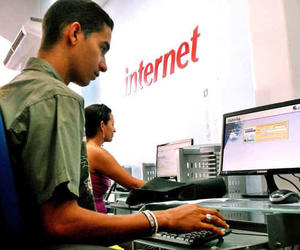Cuba's Internet: It's Bad, But It Might Get Better
- Submitted by: lena campos
- Computers and Internet
- 08 / 09 / 2013

There's no use in trying to watch a YouTube video, and chances are you won't be able to find that cute Cuban you just met on Facebook or Twitter, much less Skype with her or send her an email while on the island of Cuba.
The country, despite recent advances, is still a dark hole in matters relating to web connectivity. The country consistently ranks as the least connected in the Western Hemisphere and there are a myriad of problems that prevent the population from participating in the World Wide Web.
The country has, however, been seeing some advances in the past few years. Here's what clearly still needs work, and what is slowly getting better.
The Bad News
Let's start with the constant problems that the island's citizens face when confronting the possibility of using services such as Skype, YouTube, Facebook, etc.: Internet access is expensive and scarce, and speeds are painfully, excruciatingly slow.
On a recent visit to Havana, rates for an hour of unlimited web access in a cyber café ranged from $6 to $10, an outrageous price when you take into account that the average salary is around $20 a month.
Cuba has 0.04 fixed broadband subscriptions per 100 inhabitants, according to the International Telecommunications Union (ITU), the U.N.'s agency that analyzes and promotes the development of information and communication technologies. The figure is six times smaller than that of Côte d'Ivoire and Ghana, four times smaller than Haiti, and is comparable only to Sudan and a handful of other African nations.
Only politicians, certain journalists, and medical students can legally access the web from their homes. A few people have illegal access points that they often profit from by selling the service on the black market. That means that regular, law-abiding Cubans can only connect through the expensive cyber cafés I mentioned above. It also takes a really long time to load most. For example, Facebook or Nytimes.com takes on average about a minute or two, which means that you end up being shortchanged for your paid time.
More worryingly, access is not really unlimited. The government still blocks several websites and the embargo prevents Cubans from using services such as Google Maps and Google Apps. Blogs from opposition figures like Yoani Sánchez, Reinaldo Escobar, and Dimas Castellanos can't be accessed on the island. In fact, your web connection tends to get even slower after you try to access these sites. Other blocked pages include Revolico, a Cuban version of Craigslist, and Univision.com. (All other news outlets I tried were available.) And in case you're wondering, porn is totally banned. Trying to access a porn site can lead to the cancellation of web access points.
All of these factors have contributed to the island's disparaging record and poor scores in global analyses of internet freedom. In 2012, Cuba ranked second to last behind Iran as the country with the least web freedom in the world, according to a global survey published by Freedom House, an international watchdog that monitors net access and restrictions in more than 40 countries.
The Good News (Perhaps)
Though they may not be momentous, there are a couple of changes that could signal a transformation for the country's internet framework.
In the past 10 years, the percentage of Cubans using the internet has risen from 3.77 percent to 25.64 percent, according to ITU estimates.
In January, Etecsa, the state-controlled telecommunications company, announced that it would start using a fiber-optic submarine cable connecting Cuba and Venezuela to provide increased internet speed and broadband capabilities.
On June 4, the Cuban government also opened 118 new cheaper access points throughout the island. The number is certainly small, but it's a welcome beginning for many Cubans. Etecsa has said that they will lower prices and offer mobile access and connections at people's homes by the end of 2014.
Given recent history, skepticism is warranted, but so is hope that more access will be available to Cuba's society.
Source: ABCNews.go.com
Comments